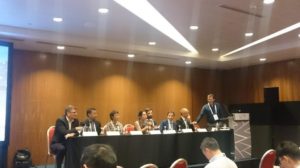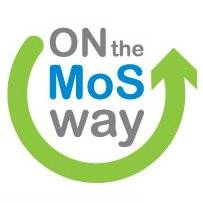ITS World Congress Singapore is themed Smart Mobility, Empowering Cities, 26th Intelligent Transport Systems World Congress, the world’s leading transport technology congress, will arrive at the shores of Singapore from 21 – 25 October 2019, with 10,000+ Participants | 300+ Exhibitors | 20+ Technical Tours and Demonstrations.
DELEGATE PROFILE

To find more about this event, please click here
At the session of the Session on port-city relation, Alexio Picco from Circle s.p.a presented Docks The Future project, with focus on the main goal of the project which is “To define the Port of the Future, meant as a near future (2030) ” which should face challenges related to but not limited to: simplification and digitalization of processes, emission reduction, energy transition, the use of renewable, & electrification, smart grids, dredging, port-city interface, and etc.

Then he continued with the introduction of the project partner, project assets, specific sub-contractors, and the platforms of dissemination the DTF news. Later he continued with the Identify appropriate KPIs (“Key Performance Indicators”) and relevant monitoring and evaluation actions Leading to the “Port of the Future Road Map for 2030” that will include a number of exploitation elements such as: tools for evaluation and transferability of Port of the Future solutions, R&D and policy recommendations, training packages and the creation of a “Port of the Future Network of Excellence”. It also mentioned that To connect the concept of Future Ports
with the UN Sustainable Development Goals by 2030, 5 Macro area, with their 36 related-Strategic Objectives were defined within the project work package.2.
It also was added that in 2017, AIVP started collaborating with Port Expertise under the broader framework of the European Project Docks the Future. A survey was done in 2018, to understand the priorities of port-city actors, by asking their leaders or top managers. To do the survey, AIVP invited 3500 organizations worldwide, of which 224 responded to the call.
The survey has 68 questions, structured in five key topics, considering relevant for port‐city relationships: spatial organization, environment, society and culture, economy
and governance. Briefly the results of the survey mentioned as per below:
- Despite the sectorial differences, and tension that may emerge among port and city actors, the survey demonstrates that there is considerable common ground in the main issues like waterfront organization, port expansion, energy or mobility.
- The cooperative approach is reflected in other answers in the survey, to develop hybrid waterfronts, preparing the local economy to answer to global companies, cooperate to finance projects or develop the port‐city interface to reduce the port nuances.
- The concern to reduce port externalities was visible in several questions, indicating that port city actors, and mostly port authorities, are increasingly aware of the problem.
- Mobility was considered an important problem for spatial organization in port cities, where there is the added challenge of port generated traffic, either by cargo or passenger.
- Circular economy was considered the last priority regarding economic issues, protecting biodiversity was not among the top‐3 environmental issues, while participatory processes were also the last priority among governance concerns.
- The ISPS has been used countless times in conferences and meetings as the main obstacle for accessibility to port areas and the fences and controls, and reduce the transparency of port areas.
In the end, it was concluded that the survey shows port – city actors recognize the importance of several key topics such as Sustainability, energy transition, circular economy, or protecting biodiversity emphasized, but still the Economic focus of ports remains dominant, not recognizing these new issues as top priorities.

